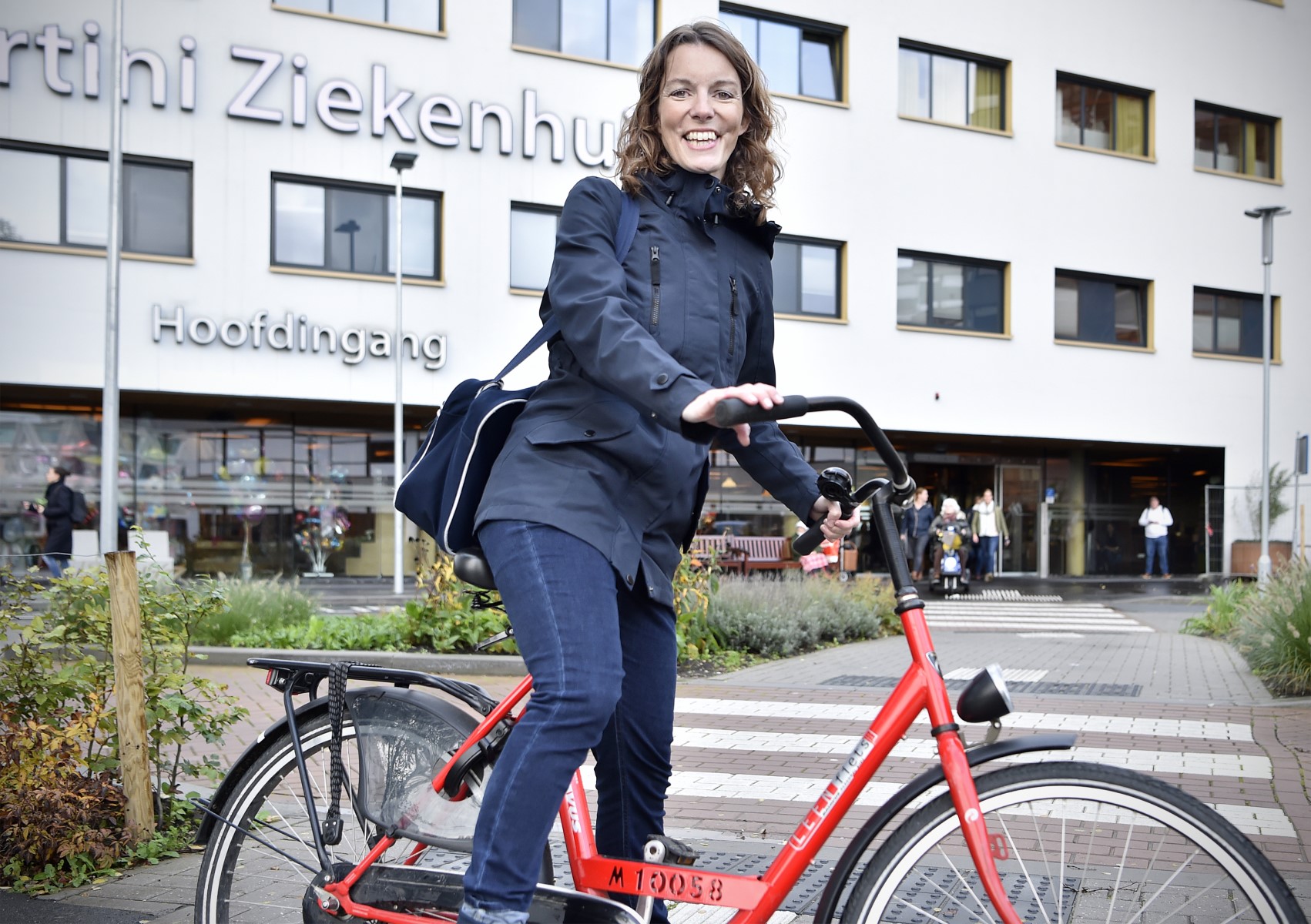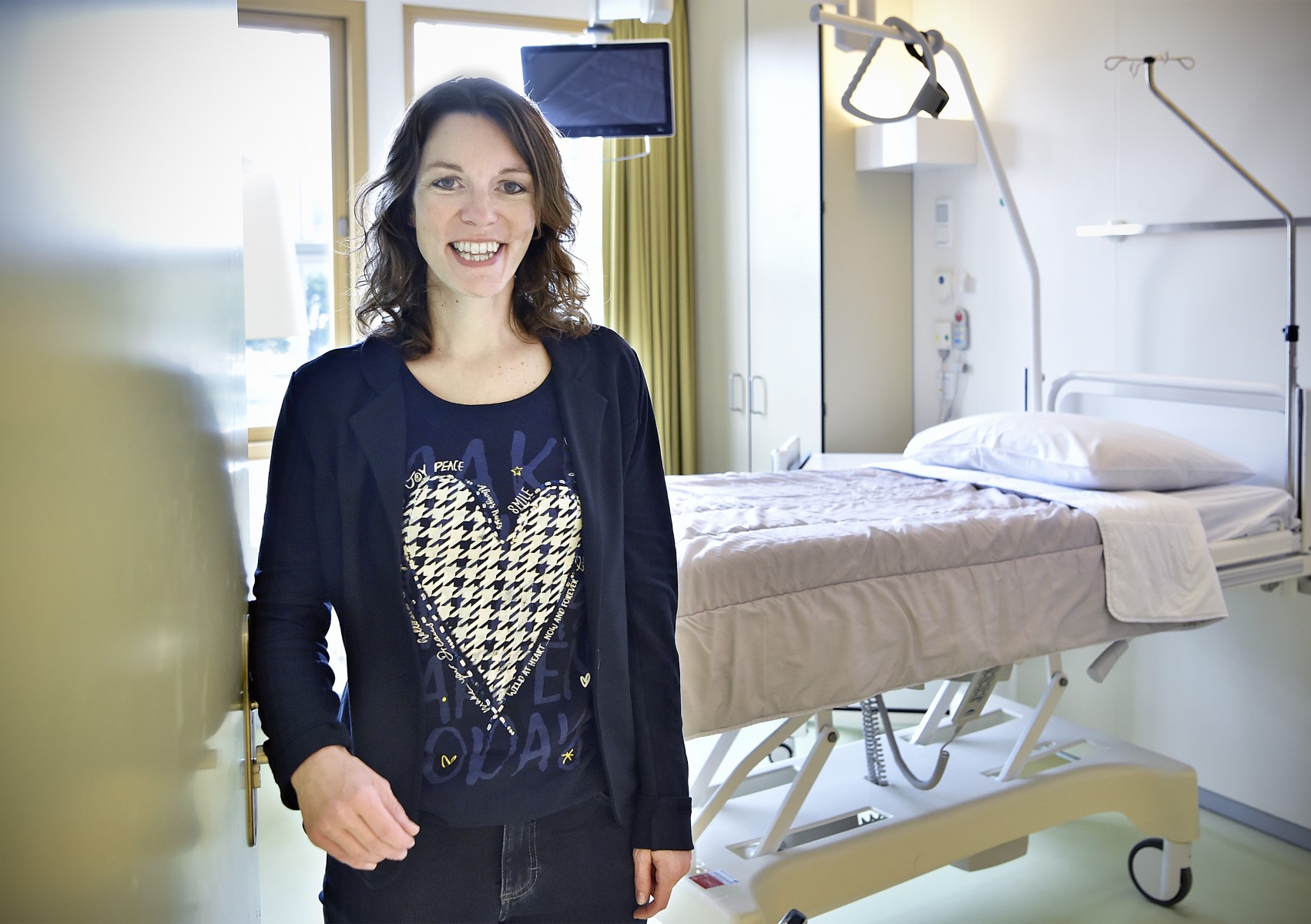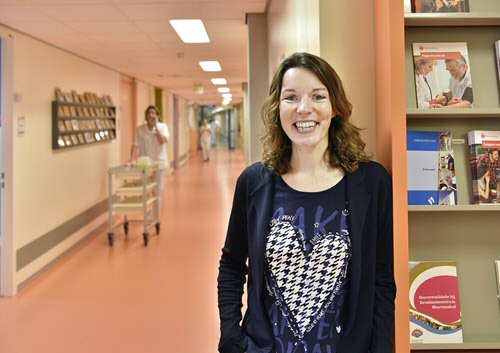Preventing the rapid decrease in healthcare staff

As a nurse, she experienced the cutbacks in healthcare first-hand. Now, 10 years later, researcher Jasperina Brouwer is looking into a solution for the resulting staff shortages. With her project ‘Back to Nightingale’ (Terug naar Nightingale), she is researching how to prevent the rapid decrease in healthcare staff– because solely recruiting new students is like filling a bucket that’s full of holes.
Text: Nynke Broersma, Communication Office / Photos: Elmer Spaargaren
Closed door
She knows enough examples from practice: urgent cases that were forwarded to another hospital because there weren’t enough staff, or departments that were vulnerable as there was sometimes only one experienced nurse available. Healthcare workers are indispensable, a fact that makes Brouwer extra motivated to carry out her research. ‘Money often goes to medical research but without nurses, everything falls apart. And you only become aware of this if you are a patient yourself, and find yourself facing a closed door.’
Outflow
Brouwer is well aware that the staff shortage in healthcare is a 'hot topic'. Although a lot of work is being put into staff intake – the university of applied sciences degree programme in Nursing has no fixed quota this year – the outflow of nurses remains a big problem. ‘We can take care of the intake, but these new students also need to be trained and need to follow a placement somewhere. Who will train them if qualified staff are leaving the healthcare sector?’
Commitment
Her research ‘Back to Nightingale’ has a clear goal: to find out how nurses can stay committed to their field of work, so that they wish to continue working in the healthcare sector. Is the commitment of nurses decreasing at the moment, then? They are really committed to their patients, right? ‘Those sorts of questions are about normative commitment’, explains Brouwer. ‘That revolves around the thought, “I can’t stop working, as I would then be abandoning my patients”. But my research focuses on affective commitment. In other words, whether your work makes you feel good and whether you can carry it out with enough energy.’

Support
‘Previous research has shown that a staff member’s relationships with other people – mostly their colleagues – and the support that they receive from those people is the most important factor explaining the increase in or reduction of commitment’, says Brouwer. ‘But we still don’t know the extent to which this influences staff withdrawal. That’s what I want to research.’
Terms of employment
Is preventing staff withdrawal not simply a question of improving terms of employment? ‘My research may show that staff would want to stay in the job if they received a higher salary. But I don’t expect that to be the case. I think that commitment is a very important precursor. If you are no longer committed to your work, you will leave.’
The importance of a good team
How can we strengthen this commitment, then? Seeing as previous research has shown that the formation of relationships is so crucial, Brouwer wants to map the entire social network of nurses – from colleagues to family and friends. ‘I will conduct a questionnaire within teams of nurses at three different moments. Up to now, most research has focused on individual factors. But a good team can be such an important reason for people to stay in their job. Who do you enjoy working with and does this increase your commitment, too? Are you confident enough to give and receive feedback?’

Staying, hesitating or leaving
As well as team processes, Brouwer is also researching the personal support networks of nurses. ‘Once every two weeks, I ask the nurses to note down in a diary app which work experiences were the most striking over the past weeks, be they positive or negative. Alongside this, they can also indicate whether they received support in these cases – and if so, from whom. A colleague, for example, or someone at home. But it may also be the case that they didn’t ask anyone for help, for example because they live alone.’ To conclude her research, Brouwer is holding interviews with three groups: nurses who have left the field, those who are still making up their minds and those who have decided to stay. In this way, she hopes to gain more insight into the decision-making process and to discover the necessities for remaining committed.
‘Back to Nightingale’
The research project has been given the thought-provoking name ‘Back to Nightingale’. What should we go back to exactly, then? ‘Florence Nightingale was a very committed nurse who put the professionalization of nursing on the map. In my opinion, professionalization is also very important for today’s nurses. If nurses require training or improvements to team processes, there must be enough scope for this. Nightingale was also very intelligent, and far more than just the “lady with the lamp”. Nurses are also still often underrated, even though they’re very skilled.’
Give praise where praise is due
Working together in a good team, receiving appreciation, being able to rely on others, having scope for professionalization: Brouwer is speaking from her own experiences. During out chat, Brouwer keeps mentioning that as a researcher, she wouldn't have come so far if it weren't for others – such as Yvonne ten Hoeve (‘I worked with her on her PhD research, but she did the most work. Give praise where praise is due!’), and the Santeon hospital group, and her appointment at the Martini Hospital in Groningen. And her primary and co-supervisors. And all the nurses that want to cooperate with her on her research. I’m already one foot out the door when she enthusiastically adds how important her colleagues at the Faculty of Behavioural and Social Sciences are. ‘They have helped me with so many things, without desiring anything in return. Here, I can develop myself in a motivating environment. Just to emphasize how important that is!’
More news
-
17 February 2026
From Ghostbuster to Disaster Researcher
-
03 February 2026
‘Such willpower’
-
20 January 2026
Alcohol, texting, and e-bikes
